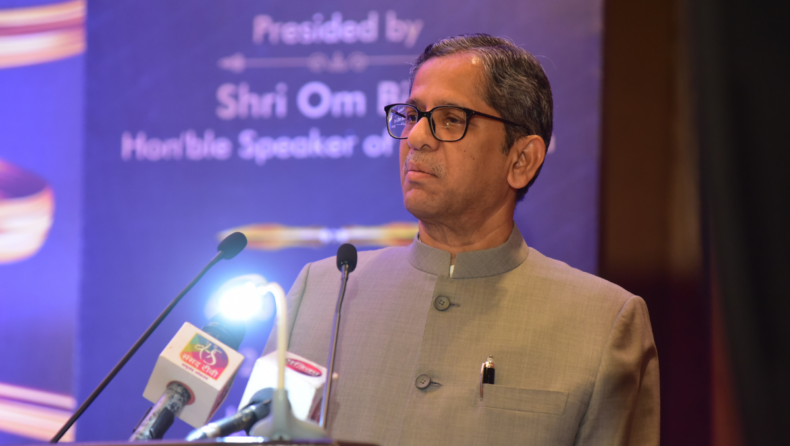At a Delhi event, he remarked, “All I want to say is that the media must limit itself to honest news and refrain from using it as a tool to increase its power and financial interests.”
NV Ramana, the Chief Justice of India (CJI), stated on Tuesday that journalists serve as the people’s eyes and ears and that independent journalism is the foundation of democracy. “A democracy’s skeleton is independent Media. The people’s eyes and ears are those of the media. In particular, given the social climate in India, it is the duty of media outlets to provide facts. People still think that whatever is written down is accurate, according to CJI Ramana.
At a Delhi event, he remarked, “All I want to say is that the media must limit itself to honest news and refrain from using it as a tool to increase its power and financial interests.”
Additionally, CJI Ramana made the point that only media outlets free of commercial obligations were able to defend democracy during gloomy times of emergency. According to him, There is no doubt that media outlets’ credibility will occasionally be examined, and appropriate inferences will be drawn from their behavior at trying times.
The Chief Justice made his most recent comments just days after criticizing electronic and social media “trials,” calling them “kangaroo courts” that sometimes make it difficult for even seasoned judges to render judgments.
Ramana emphasized the significance of judicial review in preserving the Constitution, the necessity of ensuring good judicial infrastructure, the issues raised by media trials in judicial administration, upcoming difficulties for the judiciary, and the need to provide proper judicial infrastructure.
“There is no doubt that media outlets’ credibility will occasionally be examined, and appropriate inferences will be drawn from their behavior at trying times“.During an event in Ranchi, he remarked that media trials could not be a factor in case decisions.
He had lashed out at the prejudiced viewpoints shared on social media, saying that “ill-informed and agenda-driven debates on topics regarding justice delivery are proving to be damaging to the health of democracy.He went on to add that the biased perspectives of the media are affecting society, eroding democracy, and harming the system.”
Ramana slammed those who violate their obligations and go above their responsibilities, saying that such conditions have a negative impact on the delivery of justice. By doing so, he said, they are moving our democracy backward.

The CJI also recalled the brief time in his youth when he worked as a journalist.
“Before returning to the university to pursue a legal degree, I worked as a journalist for a brief period of time. I once took public transportation to cover the news. The desire to produce outstanding public interest stories among journalists was good. I have no doubt that other journalists feel the same way about the present. However, a wonderful story that a journalist submitted is murdered at the desk after taking chances and investing a lot of time, effort, and energy. If they run into these scenarios regularly and lose faith in their career, you cannot hold them responsible.
At today’s book launch for Sri Gulab Chand Kothar’s “The Gita Vijnana Upanishad ” in New Delhi, he made these remarks in front of the general public. The Chief Justice of India praised Rajasthan Patrike Group, the book’s publisher, for sticking to its core competencies and refraining from branching out into other economic ventures in his speech. The CJI discussed the value of media outlets being true to their primary function of journalism in this setting.
The Bhagawad Gita, according to the CJI, exemplifies the majesty of our nation. He further noted that Gita’s lessons cut over religious, temporal, and epoch borders.
“We learn about the fundamental human virtues from our holy literature. They impart to us the value of a kind heart, a spirit of service, respect, and care for other people. Making sure that our kids are raised with solid morals is crucial “the CJI declared.












